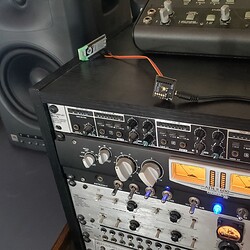Big +1 for sensor board sharing.
I’ve been using my homebrew multicast solution daily for a while now. I can’t overstate how handy it is to have the sensor board plugged in to my main audio source, and distributed to Pixelblazes in various configurations, all over the house.
Using multicast UDP between ESP8266s, I’ve seen no noticeable latency while doing this, and it’d likely be even lower going Pixelblaze->Pixelblaze.
